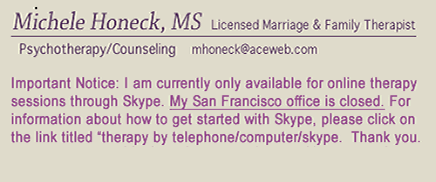|
Anxiety can range from mild to severe. Milder symptoms include nervousness, feeling tightness or pain in the chest area or stomach, excessive worry, difficulty sleeping and shyness. More severe symptoms may interfere with work or social functioning such as excessive fear of leaving the house, being in crowded public places or flying in an airplane. The more severe symptoms of anxiety are often called phobias.
Other types of anxieties include performance anxiety, anxiety about one’s weight, anxiety about riding in an elevator or anxiety about driving a car.
It can be helpful to understand, as best as possible, when the anxiety started and what keeps it going. Anxiety can be due to a sense of feeling insecure inside, an inability to process emotions, allowing negative thoughts to be in control, ineffective breathing and more. Anxiety can also sometimes be due to a chemical imbalance, in which case medical intervention may be advisable.
There are many ways to work with anxiety and I have helped many people gain a sense of inner calm. In our work you may learn to meditate, experience the benefits of guided imagery, try hypnosis, explore negative thought patterns, journal, learn to breathe in a way to enhance relaxation, learn relaxation techniques, role play and more.
If your anxiety is too high to come into therapy you may try telephone therapy or talking over the computer using Skype. Therapy over the telephone or computer allows you to stay in your home while beginning the process of learning about and overcoming your anxiety.
PTSD can occur following a recent traumatic event (car accident, surviving a fire, rape, assault) or it can be a more chronic condition left over from childhood where abuse occurred. Some symptoms include: recurring nightmares, flashbacks, an inability to perform daily tasks, startling easily, having a restricted range of affect, having a sense of a foreshortened future, difficulty falling or staying asleep, irritability and outbursts of anger and hyper vigilance.
A person recovering from PTSD needs primarily a safe and supportive place to work through and heal from the trauma. Talking about the trauma is part of the recovery process. It will be important to re-establish a sense of internal and external boundaries, externalize the trauma using imagery and learn relaxation techniques.
Therapy for stress management could include first looking over your lifestyle and seeing if any changes could be made there to reduce your stress. Even though we mostly know that exercise, eating lots of vegetables and getting enough sleep are natural stress reducers, it is sometimes hard to stay with a self care program. We might use hypnosis as a way to strengthen the part of you that wants to live a more relaxed lifestyle. Other tools to help with stress are relaxation techniques and breathing exercises. Sometimes an unconscious compulsion to work is the underlying problem. Compulsion to work may require further understanding and additional interventions.
|


